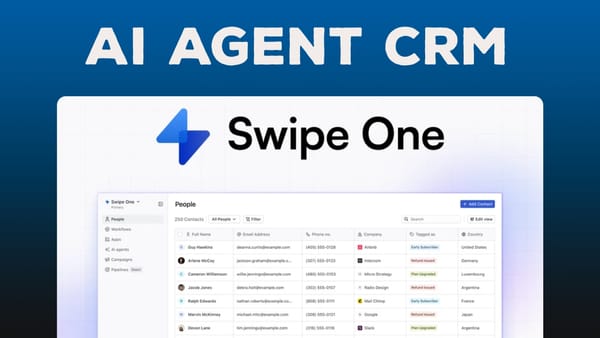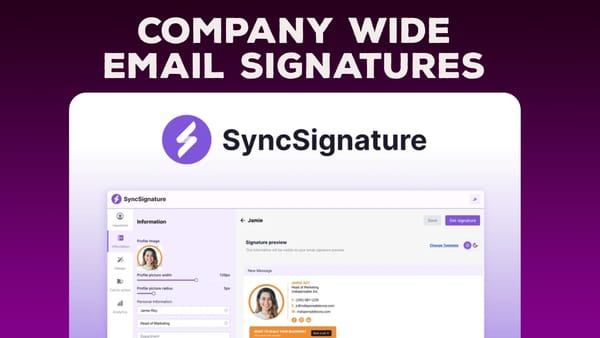Email Sending For WordPress Sites (Built for Agencies!) | Elastic Email
Experience seamless email management with Elastic Email - a cost-effective solution for WordPress sites and agencies. Perfect blend of deliverability and control.

Introduction [00:00]
In today’s digital landscape, effective email communication is crucial for businesses and agencies managing multiple websites. This comprehensive guide explores Elastic Email, a powerful solution for WordPress sites that offers robust email sending capabilities, particularly tailored for agencies. Dave from Profitable.Tools, known for his expertise in starting online businesses using off-the-shelf software, takes us through the intricacies of email sending from websites, covering both transactional and bulk emails.
This article delves into the four key criteria Dave considers when selecting an email service: inbox deliverability, security, cost-effectiveness, and ease of setup. We’ll explore how Elastic Email meets these requirements and why it’s an excellent choice for agencies and individual website owners alike. From verifying domains and setting up WordPress integration to leveraging reseller features, this guide provides a thorough walkthrough of Elastic Email’s capabilities and how they can benefit your business.
Get Elastic EmailElastic Email Intro [01:39]
Elastic Email emerges as a compelling solution for website owners and agencies looking for an efficient, cost-effective, and user-friendly email sending service. Let’s explore the key features and benefits that make Elastic Email stand out in the crowded email service provider market.
Affordability and Pricing Structure
- Elastic Email offers competitive pricing, making it an attractive option for businesses of all sizes. While not quite as cheap as Amazon SES, it’s significantly more affordable than providers like Postmark or SendGrid.
- For single website owners, the Email API plan is priced at just 10 cents per 1000 emails, matching Amazon SES’s rate. However, there’s an additional 50 cents per day fee, which amounts to about $15 per month.
- Agencies can benefit from the Email API Pro plan, which, despite being slightly more expensive, offers valuable features like sub-accounts and client billing capabilities.
API-Based Connection
- Elastic Email provides an API-based connection, ensuring a secure and reliable integration with your website or application.
- This API connection allows for automatic retries in case of failures, enhancing the reliability of your email sending process.
Easy Setup and Management
- Unlike complex solutions like Amazon SES, Elastic Email offers a straightforward setup process, making it accessible for users with varying levels of technical expertise.
- The service provides user-friendly interfaces for managing email campaigns, tracking performance, and handling administrative tasks.
Sub-Account and Client Billing Features
- For agencies, Elastic Email’s sub-account feature is a game-changer. It allows you to create separate accounts for each client, streamlining management and billing processes.
- The ability to rebill clients directly from their sub-accounts offers agencies a seamless way to monetize email services as part of their offerings.
Deliverability Focus
- Elastic Email prioritizes inbox deliverability, a crucial factor for ensuring your emails reach their intended recipients.
- The service provides tools and best practices to help maintain high deliverability rates, protecting your sender reputation.
Versatility in Email Types
- Elastic Email supports both transactional and bulk email sending, catering to a wide range of use cases.
- Whether you’re sending password resets, receipts, or large-scale marketing campaigns, Elastic Email has you covered.
By addressing the key pain points of affordability, ease of use, and agency-specific features, Elastic Email positions itself as a comprehensive solution for WordPress sites and agencies looking to streamline their email sending processes. In the following sections, we’ll dive deeper into the setup process and explore the advanced features that make Elastic Email a standout choice in the email service provider landscape.
Verifying a domain & WP Setup [03:10]
Setting up Elastic Email for your WordPress site involves a few crucial steps, including domain verification and WordPress integration. This section will guide you through the process, ensuring a smooth setup for optimal email performance.
Domain Verification Process
Log into Elastic Email Dashboard:
- Access your Elastic Email account and navigate to the domain verification section.
- Click on “Add Sending Domain” to begin the process.
Add Your Domain:
- Enter your domain name (e.g., clientamp.com) to verify the entire domain, allowing you to send emails from any address within that domain.
- This approach offers more flexibility than verifying a single email address.
Configure DNS Records:
- Elastic Email will provide you with specific DNS records that need to be added to your domain’s DNS settings.
- These typically include SPF (Sender Policy Framework), DKIM (DomainKeys Identified Mail), and a tracking CNAME record.
Adding SPF Record:
- Locate your existing SPF record in your DNS settings (e.g., in Cloudflare, GoDaddy, or Namecheap).
- Append the Elastic Email SPF information to your existing record.
- This allows Elastic Email to send emails on behalf of your domain.
Setting Up DKIM:
- Add a new TXT record in your DNS settings with the DKIM information provided by Elastic Email.
- This helps receiving servers verify the authenticity of emails sent from your domain.
Configuring Tracking CNAME:
- Add a CNAME record for email tracking purposes.
- This enables Elastic Email to track opens and other engagement metrics accurately.
WordPress Integration
Install Elastic Email Plugin:
- In your WordPress dashboard, go to Plugins > Add New.
- Search for “Elastic Email” and install the official plugin.
- Activate the plugin once installation is complete.
Configure Plugin Settings:
- Navigate to the Elastic Email settings in your WordPress dashboard.
- Select “All WordPress emails via the Elastic Email API” as your mailer option.
Obtain API Key:
- Log into your Elastic Email account and create a new API key.
- Choose “Plugin” permissions for the API key to ensure appropriate access levels.
Enter API Key in WordPress:
- Copy the generated API key and paste it into the corresponding field in the WordPress plugin settings.
Set Email Type:
- Choose between “Marketing Email” and “Transactional Email” based on your primary use case.
- For websites using third-party services like MailChimp for marketing emails, select “Transactional Email.”
Configure Sender Information:
- Enter the “From Name” and “From Email Address” to be used for outgoing emails.
Test Connection:
- After saving your settings, the plugin should display a “Connected and Active” status.
- Send a test email to verify the setup is working correctly.
Deliverability Testing
Use mail-tester.com:
- Visit mail-tester.com to obtain a temporary email address for testing.
- Send a test email from your WordPress site to this address.
Analyze Results:
- Check the score and detailed report provided by mail-tester.com.
- A perfect score of 10/10 indicates excellent deliverability setup.
Review Specific Metrics:
- Examine individual factors like SPF, DKIM, and content analysis.
- Address any issues highlighted in the report to improve deliverability.
By following these steps, you’ll successfully verify your domain with Elastic Email and integrate it seamlessly with your WordPress site. This setup ensures that your emails are properly authenticated, improving deliverability and maintaining your sender reputation. The combination of proper DNS configuration and WordPress integration sets a solid foundation for reliable email sending from your website.
Reseller Features [09:55]
Elastic Email’s reseller features provide agencies with powerful tools to manage multiple clients efficiently. These features are available on the Email API Pro plan and offer a range of options for customization and control. Let’s explore the key reseller features and how they can benefit your agency.
User Accounts Management
Team Member Access:
- Add multiple team members to your Elastic Email account.
- Customize access levels for each user, ranging from view-only to full administrative rights.
Granular Permissions:
- Set specific permissions for each team member, allowing for precise control over account access.
- Tailor user roles to match your agency’s workflow and security requirements.
Sub-Account Creation and Management
Client Sub-Accounts:
- Create separate sub-accounts for each of your clients.
- Provide clients with their own login credentials for accessing their email settings and analytics.
Email Credit Allocation:
- Set specific email credit quotas for each sub-account.
- Choose between providing a fixed number of credits or setting up automatic monthly refills.
Unlimited vs. Limited Sending:
- Option to allow unlimited sending through your primary account or set strict limits for each client.
- Flexibility to adjust settings based on client needs and your agency’s billing model.
Email Settings Customization
Max Email Size:
- Set limits on the maximum size of emails sent through each sub-account.
- Prevent clients from sending excessively large attachments that could impact deliverability.
Daily Sending Limits:
- Implement daily email sending limits for each sub-account.
- Ensure clients don’t exhaust their email credits too quickly and maintain consistent sending patterns.
Advanced Features for Client Management
Private IP Purchases:
- Allow clients to purchase private IP addresses for their email sending.
- Isolate high-volume or sensitive senders to protect the reputation of other clients.
Domain Validation Requirements:
- Enforce domain validation for all sub-accounts to maintain high deliverability standards.
- Prevent unauthorized use of your default sending domain by requiring clients to verify their own domains.
Custom Branding Options
White-Label Email Portal:
- Create a custom-branded email portal for your clients.
- Use your own domain for the portal URL, enhancing your agency’s professional appearance.
Support and Payment Links:
- Customize support links to direct clients to your agency’s support channels.
- Set up payment URLs for easy client billing and credit purchases.
Logo Integration:
- Add your agency’s logo to the email portal and email footers.
- Reinforce your brand identity throughout the client’s email experience.
Single Sign-On (SSO) Integration
Seamless Authentication:
- Set up single sign-on to allow clients to access their email portal directly from your agency’s dashboard.
- Improve user experience by eliminating the need for separate login credentials.
Enhanced Security:
- Leverage your existing authentication system to manage access to email services.
- Maintain centralized control over user access and permissions.
By leveraging these reseller features, agencies can create a comprehensive email management solution tailored to their clients’ needs. The ability to create and manage sub-accounts, customize settings, and provide a branded experience enhances your agency’s value proposition. These features not only streamline your operations but also offer opportunities for additional revenue streams through email service reselling.
Get Elastic EmailConclusion [17:47]
As we wrap up this comprehensive guide to Elastic Email for WordPress sites and agencies, it’s clear that this solution offers a powerful and flexible approach to email sending. Let’s recap the key points and benefits that make Elastic Email stand out in the crowded email service provider market.
Key Takeaways
Comprehensive Email Solution:
- Elastic Email provides a robust platform for both transactional and bulk email sending, catering to a wide range of business needs.
- The service balances affordability with advanced features, making it suitable for individual website owners and agencies alike.
Cost-Effective Pricing:
- While not the cheapest option available, Elastic Email offers competitive pricing that undercuts many popular alternatives.
- The pricing structure, especially for the Email API Pro plan, provides excellent value for agencies managing multiple clients.
Easy Setup and Integration:
- The straightforward domain verification process and WordPress plugin make it easy to get started with Elastic Email.
- API-based connections ensure secure and reliable integration with your website or application.
Strong Focus on Deliverability:
- Elastic Email prioritizes inbox deliverability, providing tools and best practices to maintain high delivery rates.
- The ability to conduct deliverability tests and monitor performance helps maintain a strong sender reputation.
Powerful Agency Features:
- Sub-account creation and management allow agencies to efficiently handle multiple clients under one master account.
- Customizable email quotas, sending limits, and billing options provide flexibility in client management.
White-Label Capabilities:
- The option to create a branded email portal enhances the professional appearance of agency services.
- Custom domains, logos, and support links reinforce brand identity throughout the client experience.
Scalability and Advanced Options:
- Features like private IP purchases and single sign-on integration cater to growing agencies and complex client needs.
- The platform’s flexibility allows for scaling services as your agency or client base expands.
Final Thoughts
Elastic Email emerges as a compelling choice for WordPress sites and agencies looking for a reliable, cost-effective, and feature-rich email sending solution. Its balance of affordability, ease of use, and advanced features addresses many of the pain points associated with other email service providers.
For agencies, the reseller features offer a significant advantage, providing the tools needed to manage multiple clients efficiently while opening up new revenue streams. The white-label options and customization capabilities allow agencies to offer email services as a seamless extension of their brand.
Individual website owners will appreciate the straightforward setup process and competitive pricing, making Elastic Email an attractive alternative to more complex or expensive solutions.
As email continues to be a critical component of online business communication, choosing the right email service provider is crucial. Elastic Email’s comprehensive approach, combined with its focus on deliverability and user-friendly features, positions it as a top contender in the market.
Whether you’re managing a single WordPress site or overseeing email services for multiple clients, Elastic Email offers the flexibility, reliability, and features needed to streamline your email operations and enhance your communication capabilities.
To get started with Elastic Email and explore its features firsthand, you can take advantage of their 14-day free trial. This trial period allows you to test the service and see how it fits into your workflow before making a commitment.
For more insights on leveraging tools like Elastic Email to build and grow your online business, be sure to check out Profitable.Tools. The newly launched community section provides a platform for discussing strategies, sharing experiences, and staying updated on the latest developments in the world of online business tools.
By choosing Elastic Email, you’re not just selecting an email service provider; you’re investing in a comprehensive solution that can grow with your business and help you deliver exceptional email communication to your clients and customers.




